Genealogy
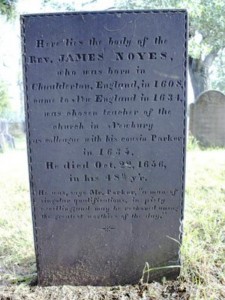 The Noyes side of Bob’s family was a family of prominence. The American side of the family begins with the Reverend William Noyes who was born in England in 1568. While William remained in England all his life, two of his children and a distant cousin left England and immigrated to America, settling in the Massachusetts area. The occupations included ministers of the Gospel, doctors, and commissioned army officers. One interesting fact is that in nearly every generation, there were two siblings who married siblings from another family. I have seen this is many families, including my own, and it makes me wonder if part of the reason is that there were fewer people around with children of suitable age to marry the children of a family. This might have been the case, especially when families began to move out west. In the history of the Noyes family that points out these siblings marrying siblings of another family, I find that Dr James III married Ann Sanford, who was the daughter of Governor Peleg and Mary Sanford, and his brother, Colonel Thomas Noyes married Ann’s sister, Elizabeth Sanford. While this is a bit unusual, it does happen, and there is nothing wrong with it. The fact that it happened about once a generation is a bit more unusual, but I guess it could be that these siblings had similar taste in mates.
The Noyes side of Bob’s family was a family of prominence. The American side of the family begins with the Reverend William Noyes who was born in England in 1568. While William remained in England all his life, two of his children and a distant cousin left England and immigrated to America, settling in the Massachusetts area. The occupations included ministers of the Gospel, doctors, and commissioned army officers. One interesting fact is that in nearly every generation, there were two siblings who married siblings from another family. I have seen this is many families, including my own, and it makes me wonder if part of the reason is that there were fewer people around with children of suitable age to marry the children of a family. This might have been the case, especially when families began to move out west. In the history of the Noyes family that points out these siblings marrying siblings of another family, I find that Dr James III married Ann Sanford, who was the daughter of Governor Peleg and Mary Sanford, and his brother, Colonel Thomas Noyes married Ann’s sister, Elizabeth Sanford. While this is a bit unusual, it does happen, and there is nothing wrong with it. The fact that it happened about once a generation is a bit more unusual, but I guess it could be that these siblings had similar taste in mates.
One of the main reasons that some of the Noyes men moved to American is the same as the reason that many of the first settlers came to America…religious differences with the Church of England. The United States has always been a country that prides itself of personal and religious freedoms. James, who is my husband, Bob’s 7th great grandfather, and who was born in England in 1608, married Sarah Brown, and they immigrated to America, and shortly thereafter, he became one of the founders of Newbury, Massachusetts, where he and his wife settled. He was a minister of the Gospel there for twenty years, and was very well liked in the area. His memory is still precious there to this day.
The Reverend James II, who is my husband, Bob’s 6th great grandfather, and who is the second son of James I and Sarah, followed in the footsteps of his dad, as a minister of the Gospel. His biggest claim to fame is that he bore an active part in the founding of Yale College, and his name was the first of “Ten of the principal ministers in the colony, nominated and agreed upon by general consent both of the ministers and people to stand as Trustees or Undertakers, to found, erect and govern a college.” He was selected to be one of the first trustees and founders of Yale. By this time he was an old man and lived in a remote part of the county, but his influence was considered essential to the undertaking. During his ministry he is noted to have baptized one thousand one hundred and seventy-six persons.
Deacon Noyes, who is the fifth son of Reverend James Noyes II, and Bob’s 5th great grandfather, married Dorothy Stanton, which is part of the 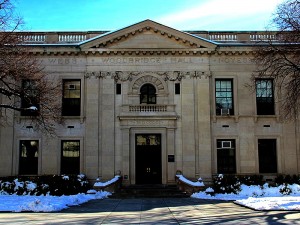 reason I have to wonder in there is a connection between my dad’s half brother’s mother, Edna Stanton, and Bob’s family through Dorothy Stanton. My grandfather, Allen Spencer, and Edna Stanton Spencer had a daughter, who they named Dorothy, and that along with the name Stanton, gives one reason to wonder. I am encouraged a little bit in my search, in that the Noyes family kept good family records. I hope this will be a useful when it comes to a possible connection between the Stantons of the Noyes family, and the Stanton of the Spencer family. Whatever happens, I find that the Noyes family were honorable people of distinction. They were active in their communities, loved and respected, making them a great American family.
reason I have to wonder in there is a connection between my dad’s half brother’s mother, Edna Stanton, and Bob’s family through Dorothy Stanton. My grandfather, Allen Spencer, and Edna Stanton Spencer had a daughter, who they named Dorothy, and that along with the name Stanton, gives one reason to wonder. I am encouraged a little bit in my search, in that the Noyes family kept good family records. I hope this will be a useful when it comes to a possible connection between the Stantons of the Noyes family, and the Stanton of the Spencer family. Whatever happens, I find that the Noyes family were honorable people of distinction. They were active in their communities, loved and respected, making them a great American family.
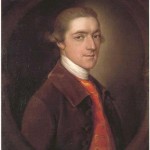 Most people know that Princess Diana married Prince Charles, and for a lot of people that is the extent of the Spencer ties to the British Aristocracy. That assumption couldn’t be further from the truth. The Spencer family is one of Britain’s preeminent aristocratic families. In the family line, there have been knights, baronets, and members of the royal family. Hereditary titles include dukedom of Marlborough, earldom of Sunderland, as well as Spencer and Churchill viscountcy. Of course, the two most well known members were Sir Winston Churchill and Princess Diana, with the current addition of Princes William and Henry, and now George.
Most people know that Princess Diana married Prince Charles, and for a lot of people that is the extent of the Spencer ties to the British Aristocracy. That assumption couldn’t be further from the truth. The Spencer family is one of Britain’s preeminent aristocratic families. In the family line, there have been knights, baronets, and members of the royal family. Hereditary titles include dukedom of Marlborough, earldom of Sunderland, as well as Spencer and Churchill viscountcy. Of course, the two most well known members were Sir Winston Churchill and Princess Diana, with the current addition of Princes William and Henry, and now George.
So the question remains, how did this family rise to wealth, or were they born into it? The answer is that the Spencer family rose to wealth from humble beginnings. A close relative of Henry Spencer who died in 1478, was John Spencer who in 1469 had become a feudal lord of Wormleighton in Warwickshire and a tenant of the now famous to most people, Altrop in Northamptonshire in 1486. His nephew, Sir John Spencer, who died in 1522, first made a living trading in livestock and other commodities. He was able to save enough money to purchase both the Wormleighton and Altrop lands, and the estate of Altrop with its moated house and several hundred acres of farmland. The family grazed sheep on the land. As time went on, he purchased more and more land. He then rebuilt the Altrop house in 1508 and it became the family home for the 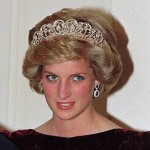 next nineteen generations. By the 16th century the Spencer family had entered Parliament in the person of Sir Robert Spencer (1570 – 1627) who represented Brackley in Parliament. He was made a Knight of the Garter and created Baron Spencer of Wormleighton in 1601. During the reign of King James I, Sir Robert Spencer was reputed to be the richest man in England.
next nineteen generations. By the 16th century the Spencer family had entered Parliament in the person of Sir Robert Spencer (1570 – 1627) who represented Brackley in Parliament. He was made a Knight of the Garter and created Baron Spencer of Wormleighton in 1601. During the reign of King James I, Sir Robert Spencer was reputed to be the richest man in England.
There were those in the British aristocracy, such as the more established Howard and FitzAlan ancestors, who didn’t approve of the Spencer’s rise to wealth through sheep herding, and who tried to act more officially aristocratic, but they were shot down in a heated debate when Lord Spencer replied, “When my ancestors, as you say, were keeping sheep, your ancestors were plotting treason.” I’m sure this did not go over well, but apparently, they were not able to dispute that accusation, and so the subject was dropped. There have been countless other Spencers in the British Parliament, as well as the House of Commons. The Spencer family has been influential in much of the lawmaking in England, as well as in the area of British economics.
I guess I don’t quite understand why the other aristocratic families didn’t like the way that the Spencer family rose to wealth, but I think that in the area of wealth and politics, the old money and old political families often 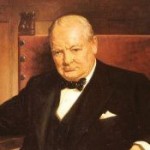 don’t like having new upstarts invading their supposed territory. I don’t think it is much different in any country. The wealthy families tend to like their power and prestige, and really don’t want to share those things much. I seriously doubt that they ever gave any thought to where their own wealth came from. Later, after the upstart families are established, they simply have to accept it. It reminds me of the unsinkable Molly Brown on the Titanic. The established money didn’t like her marrying into her money. They didn’t feel like she belonged, but she didn’t care, and she was nevertheless a force to be reckoned with, so they had to treat her with respect. That is what has had to happen with the Spencer family, and now, their aristocracy is no longer questioned by any of the British aristocratic families.
don’t like having new upstarts invading their supposed territory. I don’t think it is much different in any country. The wealthy families tend to like their power and prestige, and really don’t want to share those things much. I seriously doubt that they ever gave any thought to where their own wealth came from. Later, after the upstart families are established, they simply have to accept it. It reminds me of the unsinkable Molly Brown on the Titanic. The established money didn’t like her marrying into her money. They didn’t feel like she belonged, but she didn’t care, and she was nevertheless a force to be reckoned with, so they had to treat her with respect. That is what has had to happen with the Spencer family, and now, their aristocracy is no longer questioned by any of the British aristocratic families.
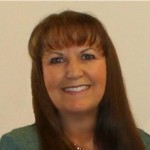
 As I was working on my family history this week, I find myself, once again, running into brick walls. These walls were not created by the normal lack of information in Ancestry or any other source that I use, but rather too much information. How could that be, you might ask. Well the problem is that in my family as in many families, there are certain names that were well liked and used often. I realize that handing down a name is usually a show of love and respect for the person from whom the name originated, but in the Spencer family they went a little overboard. There are so many people with the same names, that it becomes totally confusing.
As I was working on my family history this week, I find myself, once again, running into brick walls. These walls were not created by the normal lack of information in Ancestry or any other source that I use, but rather too much information. How could that be, you might ask. Well the problem is that in my family as in many families, there are certain names that were well liked and used often. I realize that handing down a name is usually a show of love and respect for the person from whom the name originated, but in the Spencer family they went a little overboard. There are so many people with the same names, that it becomes totally confusing.
In one family whose dad is named Thomas, and the family had ten children, there would usually be a Thomas among the children. Now that makes sense to me, but when those ten children had children, invariably there would be one Thomas from each child. So now, you have a total of twelve Thomases is the family. If each of those ten grandsons names Thomas had ten children and had a Thomas among them, you would now have one hundred and two Thomases. If the next generation continues the tradition…well, you get the picture. It is a family that is overrun by Thomases. Now, add to that the fact that names like John, Robert, William, Allen, Thomas, Michael, and Christopher, were also names that were prevalent, and remembering this family’s love for passing down names, and you can see how hard it would be to find the right one, when you are looking for a specific connection.
No wonder my parents chose to give their children names like Cheryl (the least unusual name among us), Caryn, Caryl, Alena, and Allyn. While I have come across other Karen Spencers and other Caryns in general, I have yet to find another Caryn Spencer or Caryn Schulenberg. Now, I don’t say that it is impossible, and I realize that down the road a ways, there could be another, but it is rather unlikely. When I had children, I followed the tradition of my parents on my oldest, child, Corrie, but not on my youngest child, Amy. Still, with their last name being Schulenberg, I never found another one. They have both long since married, and their last names are a bit more common, so it is possible for them to find another Corrie Petersen (although probably not spelled the same) or Amy Royce (which I have found).
Corrie broke from tradition, and named her sons common names, Christopher and Joshua, but the last name spelling could still make it easier from an genealogy perspective, but Amy stayed with the tradition by naming her children Shai and Caalab. While Shai has found another person with a similar name, the last name was spelled Royes. She has found other Shais in general, because it is a more common name in Hebrew, but in her realm of the genealogy world, I doubt she will find another one, unless she passes the name down. Caalab will be hard pressed to find another one too, unless he passes down his name as well…simply because of the unique spelling of his name. There may be other Caleb Royces in this world, but probably not another Caalab Royce, unless he is a son or grandson of this Caalab.
I think that most of us, who have unusual names, really like that fact, because it makes us unique. And from a 
 genealogy standpoint, the future searchers for their family history will likely be grateful for those unusual names, because it is much harder to end up with the wrong one in your family tree. People don’t have to figure out which Thomas, Robert, or Christopher this one is. Periodically, I have wondered what it would be like to have a more common name like Karen Smith or something, but I have always decided that I really like my unusual name…both of them in fact. They are what makes me quite unique, and in the family tree, people know they have found me, because I am the only me that exists.
genealogy standpoint, the future searchers for their family history will likely be grateful for those unusual names, because it is much harder to end up with the wrong one in your family tree. People don’t have to figure out which Thomas, Robert, or Christopher this one is. Periodically, I have wondered what it would be like to have a more common name like Karen Smith or something, but I have always decided that I really like my unusual name…both of them in fact. They are what makes me quite unique, and in the family tree, people know they have found me, because I am the only me that exists.
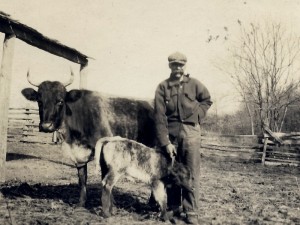 My great grandfather, William Malrose Spencer I, was a hard working man, who had a lot of stress in his life. It is my understanding that he was a stern man, which was probably common for the times, but my guess is that he was a Type A personality. These days, we know that high stress and a Type A personality are sure fire ways to an early grave. I can’t say that my great grandfather died what would be considered an early death in 1922, but these days, it certainly would be considered young. He was 64 years old, when he dropped dead of a heart attack right after hauling a bunch of logs up to a fence so they could be used for repairs around the farm.
My great grandfather, William Malrose Spencer I, was a hard working man, who had a lot of stress in his life. It is my understanding that he was a stern man, which was probably common for the times, but my guess is that he was a Type A personality. These days, we know that high stress and a Type A personality are sure fire ways to an early grave. I can’t say that my great grandfather died what would be considered an early death in 1922, but these days, it certainly would be considered young. He was 64 years old, when he dropped dead of a heart attack right after hauling a bunch of logs up to a fence so they could be used for repairs around the farm.
On first glance at the picture of him with his cows, I saw a strong man taking care of his animals. But this picture was taken just a short time before Great Grandpa’s death. How could a man look so strong one day, 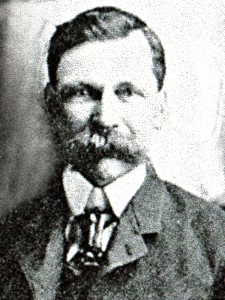 and be dead of a heart attack just a short time later. Upon closer examination, I noticed that he was smoking a pipe. I suppose that his smoking could have contributed to a heart attack…especially when added to his Type A personality and high stress lifestyle. So many things that can contribute to an early death, were virtually unknown to people just a few years ago.
and be dead of a heart attack just a short time later. Upon closer examination, I noticed that he was smoking a pipe. I suppose that his smoking could have contributed to a heart attack…especially when added to his Type A personality and high stress lifestyle. So many things that can contribute to an early death, were virtually unknown to people just a few years ago.
These days, while we don’t always pay attention to the experts on health issues, we are told what things can be detrimental to our health. Quite possibly, if my great grandfather had known what things he was doing that were likely to lead to a heart attack, he would have lived his life a little differently. These days too, we know about things like CPR, aspirin, blood thinners, and heart medications. Any one of those things could have prolonged his life…even after the heart attack. Unfortunately, none of these things was available…or at least not in the current forms that we have these days. So when the heart attack happened, Great Grandpa was simply gone in the blink of an eye. It is entirely possible that when the attack happened, he was alone, and that nothing could have been done when he was discovered, but just as many people in those days have had their heart stop and no one knew what to do, so they died even though there were people with them. While mouth to mouth resuscitation was first introduced in 1740 to save a drowning victim, CPR was not developed 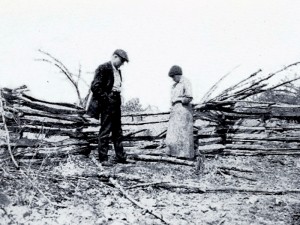 until 1960. Before that, if there was no heartbeat, it was all over.
until 1960. Before that, if there was no heartbeat, it was all over.
It seems so sad to me that people back then died when there was often a simple way to resuscitate them and save their life. People simply didn’t know it. Those techniques had not come about yet. I’m sure that when people learned of those things later, they felt a twinge of sadness over the loss of a loved one who might have been saved has they lived in a different day and age. I know that as new technology comes about now, I feel sad for those who could have been helped by it, but there is nothing that can be done now. It was how things were in that time.
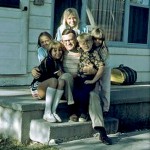 I suppose that everyone has an aunt or uncle that they connect with better than some of the others, and while the choice would be really tough for me to make, because I have so many great aunts and uncles, I would, nevertheless have to go with my Uncle Bill Spencer, who is my dad’s brother. Uncle Bill and I have always clicked. I notice many ways that we are alike. It was Uncle Bill that taught me how to play cribbage, and when they came to town, the rest of the family was hard pressed to spend much time with him…unless they wanted to watch us play. It was Uncle Bill who got me interested in coin and stamp collecting. I think I liked pretty much anything he was interested in.
I suppose that everyone has an aunt or uncle that they connect with better than some of the others, and while the choice would be really tough for me to make, because I have so many great aunts and uncles, I would, nevertheless have to go with my Uncle Bill Spencer, who is my dad’s brother. Uncle Bill and I have always clicked. I notice many ways that we are alike. It was Uncle Bill that taught me how to play cribbage, and when they came to town, the rest of the family was hard pressed to spend much time with him…unless they wanted to watch us play. It was Uncle Bill who got me interested in coin and stamp collecting. I think I liked pretty much anything he was interested in.
While my interest in those things didn’t last very long, there was something that Uncle Bill got me interested in that has stayed with me for years…genealogy. Uncle Bill has been interested in the family history since he was a little boy. I can’t say that I have been interested in it quite that long, but since my girls were little for sure…and probably a while before that too. So much of what we now have is because of the work that Uncle Bill did over a lifetime. As a kid, I was certain that I hated history of any kind, but as an adult, I discovered just how interesting history can be, especially when you apply it to your own family. Most of the time, we don’t really consider the impact our own family members had on the course of history, but often they had a great impact…somewhere, at some place in time. Uncle Bill looked for the things our family did, and for the impact many of them had in history. That made them seem more real. I have also found out that some of the characters that we studied in history in school, are ancestors of mine, so that makes them even more interesting. Sometimes you just have to look at things differently, to really be able to see them for what they are.
While history and genealogy were something Uncle Bill and I shared, I can’t say that those things were the reason that we connected so well. In fact, I can’t say exactly why we connected so well…only that we did. Sometimes, it isn’t just about things you have in common, but rather about personalities. I think Uncle Bill and I were quite a bit alike in our personalities too. Maybe it was our sense of humor, or maybe our determination, but whatever it was, we always seemed to click, and it was a relationship that I always cherished.
Through the years, we tried to keep in contact with letters, but that was not always easy or successful. Uncle Bill didn’t get on the computer except to log his gun shop inventory, and so letters were just about it for him…especially since phone calls across the country back in the day could be pricey. We had thought about finding a way to play cribbage long distance, but could never get that figured out either. These days, online gaming is pretty easy, and if he had know much about the computer, we could have done it. It makes me sad that we 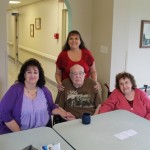 were never able to do so.
were never able to do so.
When we went to see Uncle Bill on this trip, the Alzheimer’s Disease had taken much of his recent memory from him, but when we told him that we were his brother, Allen’s family, he knew who we were. We talked abut the very distant past…his and his sibling’s childhood, and he remember playing cribbage…I think. Nevertheless, it was not the same. The relationship was locked in the past, where it will most likely remain. I wish I could be close enough to see him a little more often, and maybe we could even give a game of cribbage a try. Though I haven’t seen him nearly as much in the past few years, as I did in my younger years, I find myself missing him terribly.
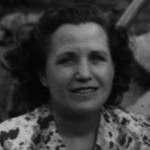 When my great aunt, Bertha Schumacher Hallgren wrote her journal, she said that, “making a record of the simple, everyday things you see, feel, and hear around you – and passing them on to posterity” would make you famous. It seems such a simple thing, and yet, whether Bertha was famous in her time or not, her journal has definitely been read by many people now, so I guess she was famous with the people who mattered. Aren’t her family members among the most important ones to read her writings. I think they are. Bertha said to write about the simple everyday things. That really is something that can have an impact on the reader.
When my great aunt, Bertha Schumacher Hallgren wrote her journal, she said that, “making a record of the simple, everyday things you see, feel, and hear around you – and passing them on to posterity” would make you famous. It seems such a simple thing, and yet, whether Bertha was famous in her time or not, her journal has definitely been read by many people now, so I guess she was famous with the people who mattered. Aren’t her family members among the most important ones to read her writings. I think they are. Bertha said to write about the simple everyday things. That really is something that can have an impact on the reader.
In her journal, Bertha talks about the first family car. It was brand new, and state of the art…and they paid $650.00 for it. When we buy a new car now, $650.00 seldom covers the monthly payment. The car itself costs upward of $31,000.00, and could cost much more. I realize that wages were much smaller when Bertha was a girl, but I have to wonder if she would just about pass out if she heard the cost of a car now. When people put gasoline in their car in 1925 they paid approximately 20 cents a gallon. These days $3.35 is pretty good for gas prices, and in some places, they pay as much as $4.35. And that is just today. Gas prices have gone up and down, and has been $6.00 a gallon before. I doubt if people from 1925 ever thought we would end up paying that kind money for gasoline today. We, of course, would love to be able to buy gasoline for 20 cents a gallon, but those days are gone forever.
When we look back on the prices of things in history, I think most are likely in proportion with the wages, for the most part. But, when we look at the difference in the prices of things, we seldom think about the wage difference. We just wonder how they expect people to pay such a horrible price for these things. I think it doesn’t occur to us that most likely we are making more money and so the prices of things aren’t really so far  out of line with the wages we make. Gas prices, especially hit hard, because the people of the United States are a very mobile people. We like our cars, and we want to be able to go when we want, and where we want. And, sometimes, that price at the pump starts eating into our ability to do that. We get annoyed.
out of line with the wages we make. Gas prices, especially hit hard, because the people of the United States are a very mobile people. We like our cars, and we want to be able to go when we want, and where we want. And, sometimes, that price at the pump starts eating into our ability to do that. We get annoyed.
I would love to be able to pay $650.00 for a new car like my great grandfather did years ago, but if you don’t mind, I would like to keep my wages right where they are when I buy that new car. That would make the price of that new car very appealing indeed…just not realistic. Whether we like it or not, the prices of things often have a pretty direct correlation with the wages of the day, and we will have to deal with it.
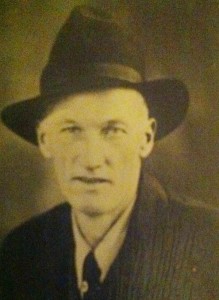 I am always surprised somehow, when a side of the family tree takes an unexpected turn. I remember years ago, talking to Bob’s grandma, Vina Leary Schulenberg Hein about her family. She had never mentioned her mother much, but I knew that she loved her dad, Chester Marion Leary and her brother, Kirby Leary very much. The events of our past can shape our views of people…sometimes forever. The reasons people do things are not always clear, and sometimes may never be known. That said, Grandma told me that her mother had left when she was a young girl. That meant that her life changed overnight. Childhood was over to a degree, because she had to help out around the house. Her dad loved her and her brother very much, and did his very best for them.
I am always surprised somehow, when a side of the family tree takes an unexpected turn. I remember years ago, talking to Bob’s grandma, Vina Leary Schulenberg Hein about her family. She had never mentioned her mother much, but I knew that she loved her dad, Chester Marion Leary and her brother, Kirby Leary very much. The events of our past can shape our views of people…sometimes forever. The reasons people do things are not always clear, and sometimes may never be known. That said, Grandma told me that her mother had left when she was a young girl. That meant that her life changed overnight. Childhood was over to a degree, because she had to help out around the house. Her dad loved her and her brother very much, and did his very best for them.
I suppose that because I was asking her about her mom, she didn’t exactly go into detail about what happened afterward. While looking through Ancestry, yesterday, I clicked on a hit for Chester Leary that took me to FindAGrave.com. I didn’t have a picture of Chester’s grave yet, so I wanted to get that. As I looked at his memorial, some of which I had seen before, because I had added the picture of him, I glanced to the relationship information, and saw that there was a child listed there that did not match what I knew of the family. I clicked on the link for Ruth Leary Dilley, and it stated that indeed Chester was her father, but her mother was Marie, not Viola, who I knew to be Chester’s wife.
Well, of course, after Viola left Chester, he did remarry. I wondered why that was not mentioned when I spoke to Grandma Hein all those years ago. Since Grandma was listed as one of Ruth’s sisters, they must have had a relationship. It was so strange to me. I suppose that Grandma thought that all I was interested in was what happened to her mother, which wasn’t exactly right, but maybe the whole situation with her mother was still a touchy area, and she didn’t think about the woman, Marie Behrendt who had become her step mother. Marie was quite a bit younger than Chester…seventeen years, in fact…so Grandma Hein was fourteen years of age when they married, and Marie was only six years older that she was, so maybe she didn’t really feel like a mother to her, and maybe not even a friend really. Nevertheless, the half sisters who were born to that second 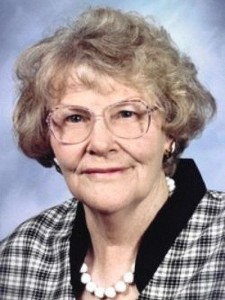 marriage certainly felt like Grandma Hein was their sister, since they listed her as Ruth’s sister. Grandma Hein was just seventeen years old when she married her first husband, Bob’s grandfather, Andrew Schulenberg, so it could be that she wasn’t really around her dad’s new wife long enough to feel like she was her mother either.
marriage certainly felt like Grandma Hein was their sister, since they listed her as Ruth’s sister. Grandma Hein was just seventeen years old when she married her first husband, Bob’s grandfather, Andrew Schulenberg, so it could be that she wasn’t really around her dad’s new wife long enough to feel like she was her mother either.
Whatever the reason, I certainly did not know about the twist the family history was about to take. Of course, I know that marriages fail and people remarry, but it just seems odd that when asked about her side of the family, Grandma Hein mentioned only the things that she had felt so negative about, and not the aftermath. I have found some of the Dilley children, and plan to attempt to contact them to see what they know of things. Once again, time will tell as to whether or not I am able to learn much more about this step grandmother and half aunts that we have through my husband, Bob’s grandmother’s family. Once again, the story continues to evolve.
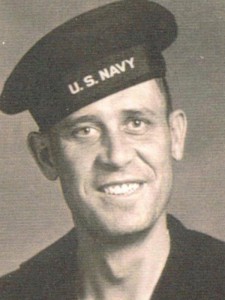 Because he passed away in 1953 at the young age of just 43 years. I never had the opportunity to know my Great Uncle Cliff. My mom tells me that he was well liked. She said he liked to make people laugh, and always had a good joke to tell. That made him someone people liked to be around. He loved stopping by his brother’s house after work. He would leave a few snacks in his lunch pail for all the little kids to raid. Of course, that made him a big hit with my mom and her siblings.
Because he passed away in 1953 at the young age of just 43 years. I never had the opportunity to know my Great Uncle Cliff. My mom tells me that he was well liked. She said he liked to make people laugh, and always had a good joke to tell. That made him someone people liked to be around. He loved stopping by his brother’s house after work. He would leave a few snacks in his lunch pail for all the little kids to raid. Of course, that made him a big hit with my mom and her siblings.
Uncle Cliff was quite a character. He loved to pick on his mom some. When he was younger, and still living at home. He had a job, and his job required that he work a half day on Saturday. Sometimes he would not come right home after work, because he knew his mother would think he was out drinking. Grandma was mad, and indeed thought he was drinking. She decided to write a big “D” on calendar…for drunk. I guess she was hoping to shame him into not doing such things. He did it to tease her, because he wasn’t drinking at all, and the big “D” on the calendar only served as a source of humor for him.
Uncle Cliff married Marie Settell on July 28, 1940, and on their wedding night, the family gave them a real Shivaree. Now for those of you who don’t know, a Shivaree is a mock serenade with kettles, pans, horns, and other noisemakers given for a newly married couple. As sometimes happens in these event, things can get out of hand, resulting in the bride being stolen from the groom for a time, and Uncle Cliff was very worried that they would steal his bride. I suppose that once he realized they weren’t going to do that, he might have thought it was a sweet thing to do, but by that time the Shivaree was over, so he couldn’t relax and enjoy it.
When the United States joined World War II, Uncle Cliff was drafted into the Navy on August 18, 1945, at the age of 36 years. He had only been married five years at that time, and they had already had some sadness in the loss of their first child, Clifford Jr in 1941. I can only imagine how hard it would be to send your husband into war, when you had only been married for five years. But then, many woman have had to do this over the years. They and their marriage would survive the war, and they would have three surviving children, Joy, Gordon, and Judy and a number of grandchildren, but unfortunately, Uncle Cliff would never get to meet them.
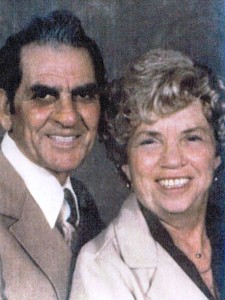 Coming home from the war would not bring the best of news. I’m not sure just how long after coming home, but Uncle Cliff had some health issues, and he unfortunately put off taking care of them, In the end, it would be cancer that would take his life at the far too young age of 43. Uncle Cliff has always seemed to be a bit of a mystery to me…like an great uncle who I knew should have known, but somehow didn’t. He was a missing part of the family. He was my Grandpa Byer’s youngest sibling, and since I knew my grandpa, who was the third from the oldest of the nine children, why wouldn’t I know his youngest brother. Oh, I know that isn’t such an oddity, because a lot of people die at a young age, but it seemed strange to me at the time.
Coming home from the war would not bring the best of news. I’m not sure just how long after coming home, but Uncle Cliff had some health issues, and he unfortunately put off taking care of them, In the end, it would be cancer that would take his life at the far too young age of 43. Uncle Cliff has always seemed to be a bit of a mystery to me…like an great uncle who I knew should have known, but somehow didn’t. He was a missing part of the family. He was my Grandpa Byer’s youngest sibling, and since I knew my grandpa, who was the third from the oldest of the nine children, why wouldn’t I know his youngest brother. Oh, I know that isn’t such an oddity, because a lot of people die at a young age, but it seemed strange to me at the time.
Five years after Uncle Cliff’s passing, Marie would again find love, even though I’m sure she thought it would never happen. She married Walter Oddsey (Johnny) Skaggs. Marie and Johnny were both well liked by the Byer family, and while they moved to California, they kept in touch with them through the years.
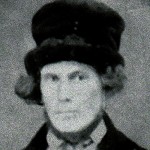 My great great grandfather, Allen Spencer and my great great grandmother, Lydia Quackenbush Potts Spencer were married on February 22, 1850 in Canastota, New York. It didn’t take them too many years to decide that New York was not where they wanted to be. So, in the spring of 1855, after the birth of their second child, Ida, who was born June 11, 1854, they packed up their belongings and their two children, and headed west. They had their hearts set on Iowa. It would be a long journey, traveling on dirt roads, camping underneath the stars, cooking over a campfire, and often going for days without seeing other people. They would have had to cross rivers with no bridges, traveling for miles sometimes before finding a place where it was safe to take the covered wagon across. Then traveling back to where they had been before. They would have most likely crossed the Mississippi at Prairie Du Chien, which was the only place north of Saint Louis to have a ferry at that time. I imagine that it seemed very odd to be around what seemed like so many people again. Then, probably after a few days, they set off again for their dream home…Iowa. It is unsure if they arrived in Iowa in 1855, or if they wintered in Prairie Du Chien before going on in the spring of 1856, but apparently Iowa was not quite what they expected, because it was not long before the family would again move…this time to Wisconsin. My great grandfather, William was born in Iowa on August 27, 1857, but by the time their next child, Luther was born on May 18, 1858, the family was living in Wisconsin.
My great great grandfather, Allen Spencer and my great great grandmother, Lydia Quackenbush Potts Spencer were married on February 22, 1850 in Canastota, New York. It didn’t take them too many years to decide that New York was not where they wanted to be. So, in the spring of 1855, after the birth of their second child, Ida, who was born June 11, 1854, they packed up their belongings and their two children, and headed west. They had their hearts set on Iowa. It would be a long journey, traveling on dirt roads, camping underneath the stars, cooking over a campfire, and often going for days without seeing other people. They would have had to cross rivers with no bridges, traveling for miles sometimes before finding a place where it was safe to take the covered wagon across. Then traveling back to where they had been before. They would have most likely crossed the Mississippi at Prairie Du Chien, which was the only place north of Saint Louis to have a ferry at that time. I imagine that it seemed very odd to be around what seemed like so many people again. Then, probably after a few days, they set off again for their dream home…Iowa. It is unsure if they arrived in Iowa in 1855, or if they wintered in Prairie Du Chien before going on in the spring of 1856, but apparently Iowa was not quite what they expected, because it was not long before the family would again move…this time to Wisconsin. My great grandfather, William was born in Iowa on August 27, 1857, but by the time their next child, Luther was born on May 18, 1858, the family was living in Wisconsin.
Having driven through Iowa recently, I can say that it is pretty flat, and at least to me, not very interesting. I suppose it was a matter of what you were looking for. Farming country wasn’t exactly what this city girl had in mind for life, which is probably why I chose to stay in Wyoming…country enough to be small and city enough to have things to do. Still, Iowa does appeal to a lot of people and in the end, it must have appealed to my great great grandparents again, because Webster City, Iowa would be where my great great grandfather, Allen Spencer would pass away, and where he is buried. My great great grandmother, Lydia Quackenbush Potts 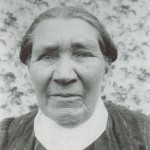 Spencer would again move on, this time to Fay, Oklahoma, where her sons lived and would pass away there twenty three years after the passing of her husband, Allen Spencer, and after seeing her many grandchildren.
Spencer would again move on, this time to Fay, Oklahoma, where her sons lived and would pass away there twenty three years after the passing of her husband, Allen Spencer, and after seeing her many grandchildren.
I don’t know if they found the winters in Wisconsin too harsh, the growing season too short, or exactly what drew them back to Iowa, but I guess it was their dream in the beginning and their dream in the end…or at least until Allen’s death. Then maybe Lydia could no longer bear to stay, or maybe she only left because of her sons. I’ll probably never know for sure, but I can relate to being near family…especially after a loss, so that is my guess as to what my great great grandmother would have wanted.
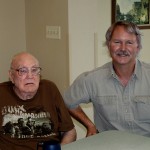
 Kids seem to think that they are invincible. I don’t know where they got such an idea, but they often take chances without giving a second thought to how dangerous something might be and whether or not they will get hurt…or worse, killed. It has been the same way throughout time, I think. Recently, while visiting my Uncle Bill Spencer, his son Bill asked him if, while walking across a railroad trestle, they had ever encountered a train. Uncle Bill confirmed that they had, and when asked what they did, he said, “We dropped under the trestle and hung on until the train had gone over.” He said that it really shook. Well, I don’t mind saying that my uncle’s revelation made my blood run cold, but when I later mentioned that to my cousin Laurie Carlson Stepp, she told me that she had done that too, and that I shouldn’t tell her mother about it. Well, Laurie, I don’t think your mom gats to read my stories, so I have kept my promise, I think. Laurie told me that all the kids she knew did that, and never gave a thought to whether or not it might be dangerous. Yes, I’m sure that’s right. Kids don’t think about stuff like that. They are invincible…right?
Kids seem to think that they are invincible. I don’t know where they got such an idea, but they often take chances without giving a second thought to how dangerous something might be and whether or not they will get hurt…or worse, killed. It has been the same way throughout time, I think. Recently, while visiting my Uncle Bill Spencer, his son Bill asked him if, while walking across a railroad trestle, they had ever encountered a train. Uncle Bill confirmed that they had, and when asked what they did, he said, “We dropped under the trestle and hung on until the train had gone over.” He said that it really shook. Well, I don’t mind saying that my uncle’s revelation made my blood run cold, but when I later mentioned that to my cousin Laurie Carlson Stepp, she told me that she had done that too, and that I shouldn’t tell her mother about it. Well, Laurie, I don’t think your mom gats to read my stories, so I have kept my promise, I think. Laurie told me that all the kids she knew did that, and never gave a thought to whether or not it might be dangerous. Yes, I’m sure that’s right. Kids don’t think about stuff like that. They are invincible…right?
My dad and Uncle Bill, and possibly even my Aunt Ruth, did the same thing. They never gave it a thought…or not that they would admit. When I think about the trestle they were on when the trains came over, the distance to the ground from there, and the fact that there was only a creek at the bottom of that trestle…I cringe. It might be my extreme dislike of heights, or it could be that hanging under a railroad trestle while a train is going over is…seriously crazy!! Nevertheless, you can’t tell kids how dangerous or crazy something is, because they know everything…right! My dad and my Uncle Bill, I have learned over the years, were certain that they were invincible. They messed around with dynamite, walked on railroad trestles, jumped on the trains even though they had a pass, and countless other stunts that make me cringe, but somehow both lived to tell about it…but I’m quite sure they didn’t tell their mother either.
A lot of the chances kids take in driving their cars can be pretty dangerous too. Things like four wheeling up a 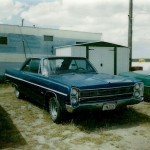
 steep hill. I have seen video after video of people rolling their vehicle trying that one. I’ve never tried that, but I can say that I’ve driven my car much faster than I should have. I think I’ll decline to say how fast, because my mother does read my stories every day, and since I have to see her pretty often, I don’t really want her to shoot me. I can say, Mom, that it was only one time, I was 18, and even my friends told me to slow down. After that, I decided that taking that kind of stupid chance with my life and the lives of my friends wasn’t worth any thrill it might have given. Like most kids, I’m wiser now.
steep hill. I have seen video after video of people rolling their vehicle trying that one. I’ve never tried that, but I can say that I’ve driven my car much faster than I should have. I think I’ll decline to say how fast, because my mother does read my stories every day, and since I have to see her pretty often, I don’t really want her to shoot me. I can say, Mom, that it was only one time, I was 18, and even my friends told me to slow down. After that, I decided that taking that kind of stupid chance with my life and the lives of my friends wasn’t worth any thrill it might have given. Like most kids, I’m wiser now.

